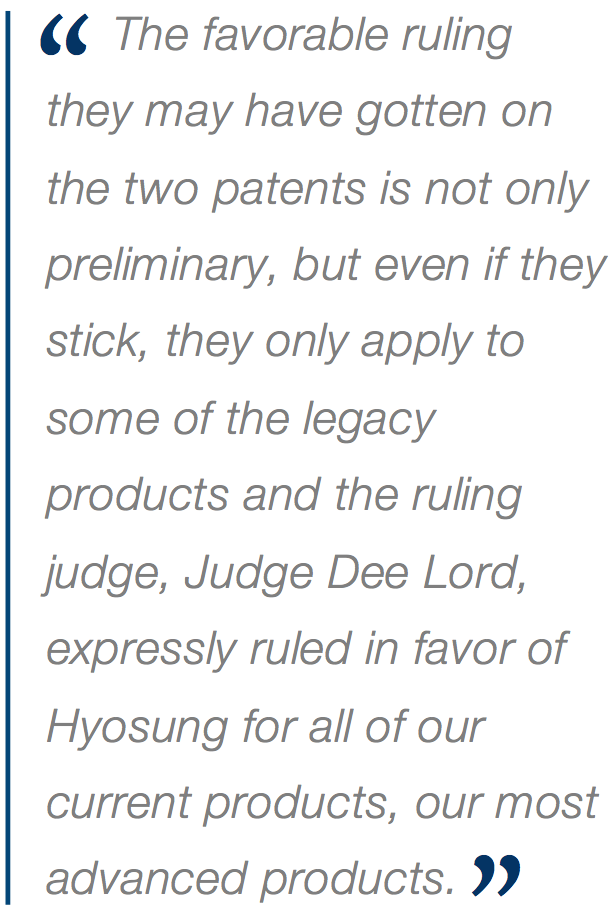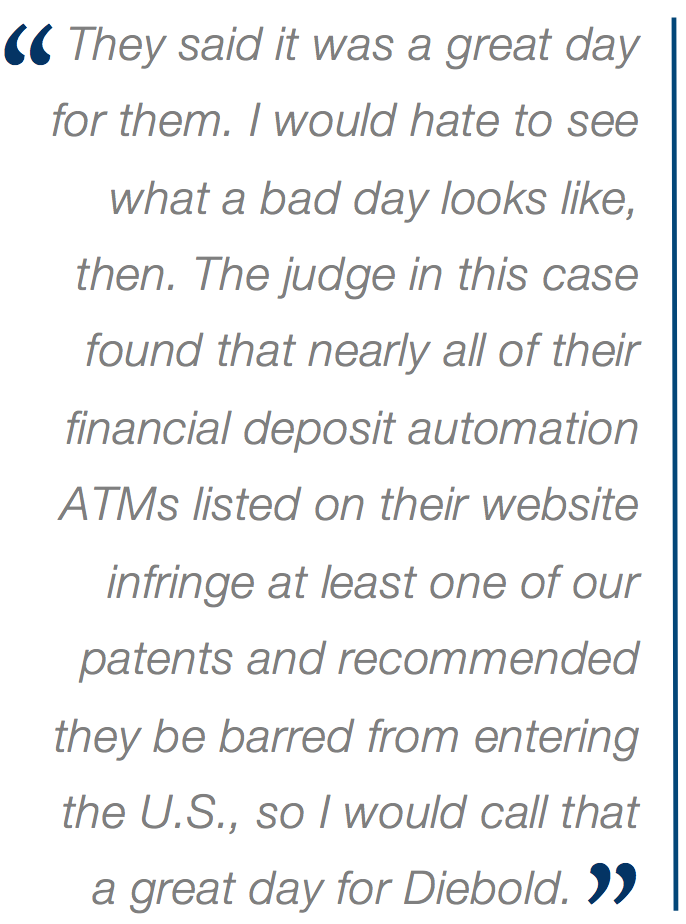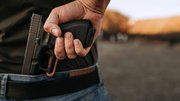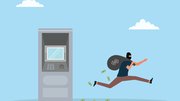Article
The Diebold-Hyosung ATM patent war: Win, lose or draw?
The competitors have been locked in a patent battle for 15 months so far. How much longer might this 'knock-down, drag-out' drag on?

January 20, 2017 by Suzanne Cluckey — Owner, Suzanne Cluckey Communications
The longest recorded boxing match with gloves took place between Andy Bowen and Jack Burke in 1893. The fight went 110 rounds and lasted seven hours and 19 minutes before being called a draw because the fighters were too exhausted to continue.
One wonders whether the current bout between Diebold Nixdorf and Nautilus Hyosung America over their respective patent infringement claims might go the same way. Civil cases can be protracted, and both Diebold v. Nautilus Hyosung and Nautilus Hyosung v. Diebold will be subject to two rounds of decisions.
The complainants filed suit and a counter suit not only in U.S. district courts, but also with the U.S. International Trade Commission, which gets first crack.
 After nearly 15 months of consideration in Diebold vs. Hyosung, an administrative judge for the ITC issued her recommendation in the matter, tossing four of Diebold's patent claims and allowing another two to stand.
After nearly 15 months of consideration in Diebold vs. Hyosung, an administrative judge for the ITC issued her recommendation in the matter, tossing four of Diebold's patent claims and allowing another two to stand.
It is now up to the ITC itself to determine whether Hyosung should be barred from importing its products into the U.S. This decision, however, will be subject to appeal and, given what's at stake, appeals seem likely.
The ITC complaint brought by Hyosung against Diebold will follow the same course. The administrative judge's initial determination could recommend the commission's action on some, all or none of Hyosung's patents. Again, appeals might ensue.
Meanwhile, back at the district court, both cases are stayed until the ITC process is concluded. And since the ITC and the district court are entirely separate entities, Diebold could choose to pare its list of six patents down to the two allowed by the ITC, or let them stand and hope for a different ruling from a different court.
The district court decision could be years away — or years upon years, with appeals.
Or, one or both sides could, like Bowen and Burke, agree to a draw and settle out of court. But at this juncture, it doesn't appear either party is leaning that way.
"Diebold tried to enter into settlement negotiations with Hyosung during the case, and Hyosung refused because it contended it didn't infringe and/or our patents were invalid," said Ed Crooks, vice president and executive counsel for intellectual property at Diebold Nixdorf.
Hyosung said. in an Oct. 20, 2015 press release, the company "would have welcomed a dialog in advance of these unprovoked aggressive actions by Diebold."
This December, the company declined to discuss whether dialog might still be an option. Nancy G. Daniels, executive vice president and COO, simply pointed out, "We didn't start this fight."
The companies are also at odds about the ramifications of the administrative judge's ruling that Hyosung violated Diebold's patents related to four-way magnetic ink character recognition technology.
To hear Diebold tell it, deposit automation would not be sufficiently secure without both magnetic ink and optical character recognition technology.
"[V]irtually all their current machines listed on their website that are financial-grade deposit automation ATMs that accept bills and that accept checks were found to infringe this technology by the administrative law judge. For existing products that infringe on the four-way MICR patent, if they rely on OCR only, we would say that we think our technology would be better and more secure. That's our position."
Daniels begged to differ.
"The detail of the patent involves some other techniques involved in reading the checks and various different kinds of orientations and so forth, which really don't matter anymore … it's rare that people are even checking for magnetic ink anymore — what people are really doing is just imaging the check."
Daniels has repeatedly said that even if the two Diebold patents are upheld, none of the companies newer products would be affected.
"[T]he favorable ruling they may have gotten on the two patents are not only preliminary, but even if they stick, they only apply to some of the legacy products and the ruling judge, Judge Dee Lord, expressly ruled in favor of Hyosung for all of our current products, our most advanced products."
 Daniels said she was "personally shocked" by the assertion that newer Hyosung products without MICR technology were less secure than legacy products, calling the claim "patently and undeniably false." Pun unintended, presumably.
Daniels said she was "personally shocked" by the assertion that newer Hyosung products without MICR technology were less secure than legacy products, calling the claim "patently and undeniably false." Pun unintended, presumably.
For Crooks, the surprise was Hyosung's response to the ITC judge's findings.
"In their press release, they said it was a great day for them. I would hate to see what a bad day looks like, then. The judge in this case found that nearly all of their financial deposit automation ATMs listed on their website infringe at least one of our patents and recommended they be barred from entering the U.S., so I would call that a great day for Diebold."
Hyosung has long held that Diebold filed suit to protect market share against incursion by the company's Korean-owned competitor, whose U.S. business grew 30 percent in 2015 and another 40 percent in 2016, according to Daniels.
Crooks flatly denied the claim.
"[T]his case was never about desperation," Crooks said. "This case was about protecting our investment in R&D and jobs in Ohio and North Carolina and across the country against unlawful copies."
It's a statement that might resonate with a good-sized segment of the American population, including that segment being installed in the White House today.
It has definitely resonated with U.S. Congressmen from Diebold's home state of Ohio. Rep. James Renacci and Sen. Sherrod Brown penned letters urging ITC Chairman Irving Williamson to fully enforce trade law against "patent-infringing foreign competitors."
Whatever the ITC decides, you can lay odds that nobody's going down for the count just yet.
photo istock
Diebold complaints
- Diebold Inc. et al v. Nautilus Hyosung Inc. et al, 1:15-cv-0215, Northern District of Ohio
- In the Matter of Certain Automated Teller Machines, ATM Modules, Components Thereof, and Products Containing Same, investigation number 337-TA-972, before the U.S. International Trade Commission
Nautilus Hyosung complaints
- Nautilus Hyosung Inc. v. Diebold Inc. et al, 3:16-cv-00364, Northern District of Texas
- In the Matter of Certain Automated Teller Machines, ATM Modules, Components Thereof, and Products Containing Same, investigation number 337-TA-989, before the U.S. International Trade Commission
About Suzanne Cluckey
Suzanne’s editorial career has spanned three decades and encompassed all B2B and B2C communications formats. Her award-winning work has appeared in trade and consumer media in the United States and internationally.
 ChatGPT
ChatGPT Grok
Grok Perplexity
Perplexity Claude
Claude












